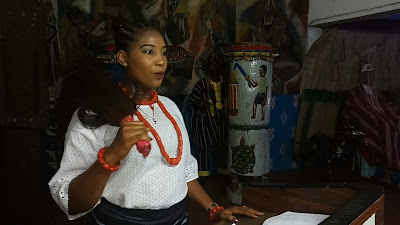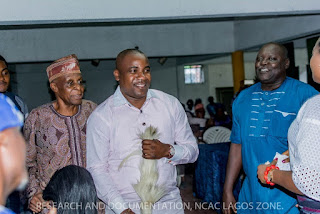By Perekeme Odon
The management and staff of National Council for Arts and Culture (NCAC), Lagos Zonal Directorate celebrated Ekiti Day with chains of remarkable cultural elucidations, which concretized the strength of unity in culture. The event that took place on August 29, 2019, was made possible by the Research and Documentation Department is about the commemoration of the diverse cultures of our land.
The cultural celebration was a very remarkable day with staff beaming in their colourful native attire that showcased and demonstrated cultures from the Yoruba tribes in Nigeria. The National Council for Arts and Culture (NCAC) promote virtues of unity in diversity.
The cultural event was packed with lots of presentational activities from preparing traditional dishes, display of colourful attires, cultural dance, music, drumming to dance performances prepared by the Lagos Zonal Performing Arts Department headed by Perekeme Odon depicting the culture of the Ekiti people. It was an enjoyable and lively day for the staff, families and friends who attended.
 |
| Head, NCAC Lagos, Mr Victor D. Omoniyi |
In his keynote address, the Head of Lagos Zonal Directorate, National Council for Arts and Culture (NCAC) Mr Victor Omoniyi advised everyone to embrace their culture and said, “This programme is going to set the ball rolling as we intend to have a documentation and data bank of Ekiti state by knowing the values and culture of the people; also know what creates cultural revenue for tourism.” He requested Nigerians to respect, evaluate and package its tourist sites so as to promote and generate revenue like other tourism nations through various value chains. “Today we are starting with Ekiti state with performance and presentation. I welcome everyone on board”
The event kicked off with the introduction of Janet Makinde Fayokemi, who gave a glowing theatrical presentation on the historical background of Ekiti state and its people from the ancient to the modern-day Ekiti state. She gave a vivid insight analysis of how the Alaafin and the seven children of Oduduwa journey out of Ile-Ife in search of other lands, Kingship and coronation in Ekiti state.
 |
| Ms Janet Makinde Fayokemi |
Ms Fayokemi said, “You are all welcome to Ekiti state, the fountain of knowledge in Nigeria and home to all. Ekiti is a land that flows with milk and honey. Ekiti as a nation and districts of Yoruba race had her progeny in Oduduwa, the father and progenitor of Yoruba race. Just like every major sub-ethnic division in Yorubaland. Ekiti has her origin from Ile-Ife (the cradle land of Yoruba land). The Olofin, one of the sons of the Oduduwa had sixteen (16) children and in the means of searching for the new land to develop, they all journeyed out of Ile-Ife as they walked through the Iwo – Eleru (crave) near Akure and had a stopover at a place called Igbo-Aka(forest of termites) closer to Ile-Oluji.
She went on to inform the audience that the Olofin, the sixteen children and some other people continued with their journey, but when they got to a beautiful flat land, the Owa-Obokun (the monarchy of Ijesha land) and Orangun of Ila decided to stay in the present Ijesha and Igomina land of in Osun state. The remaining fourteen (14) children continued the journey and later settled in the present-day Ekiti land. They discovered that there were many hills in the place and they said in their mother's language that this is 'Ile olokiti' the land of hills. Therefore the Okiti later blended to Ekiti. So Ekiti derived her name through hills.
 |
| Mrs Tolu Ayeni Presenting A Paper |
Ms Fayokemi furthermore emphasized on the culture and language of the Ekiti people. “The Ekitis are culturally homogenous and they speak the dialect of the Yoruba language known as Ikiti. Dialect, however, varies from locations. E.g. The Moba land speaks a dialect close to Igbominas in Kwara and Osun States, the Oke-Ako, Irele and Omu-Oke people speak a dialect similar to Ijumus in Kogi State, Ekiti West and Efon Alaaye, LGA speaks a similar dialect to that of Ijesas of Osun State. Ekiti state is said to have produced the highest number of professors In Nigeria.” She stated.
In another presentation, Mrs Tolulope Ayeni rendered a captivating delivering of the Ekiti culture, tradition and festivals by educating the audience about the various festivals in Ekiti state. She said Ekiti state has lots of festivals like Ijesu (New Yam Festival), Aeregbe, Egungun/ImaleIdiroko, but the Udiroko festival is the biggest in the state. Udiroko festival in Ado-Ekiti is purely the celebration of the cultural essence of the Ado people dating back to the establishment of the Ado kingdom in 1300AD.
 |
| Mrs Nneka Akwara HOD, Research & Documentation, NCAC Lagos |
The celebration of the festival gives pride of place to the history, culture and tradition of their collective existence as Ado people provides them ample opportunity to all Ado sons and daughters both at home and abroad to come together to appreciate God and pray for continuous peace and progress in the coming year. Udiroko is a euphemistic expression of the significance of the first meeting of Ado-Ekiti people under the Iroko tree to celebrate the founding of Ado kingdom.
She highlighted on the contrary general belief and mindset of the audience by enlightening them that there is no truth whatsoever in that claim that the popular Udiroko festival in Ekiti State fetish, adding there is nothing secret or fetish about the age-long festival which has become an important decimal in the cultural calendar of the state. She said, “It is a festival that has nothing to do with rituals, secrecy, fetishism or idol worship. The Udiroko festival is the New Year Day celebration of Ado kingdom to mark the traditional calendar of the year during which individual praise-worships and prayers are offered to the heavens in every home in the town.”
 |
| NCAC Lagos Performing Arts Troupe |
The fascinating expository presentation of Onyidamola Giwa on the food, tourism and tangible and intangible cultural heritage in Ekiti state made the audience go enthusiastic with her various examples. She conversed on the rich tourism potentials in Ekiti state and recommended the audience to visit. “Ekiti land is blessed with water resources; some of its major rivers are Ero, Osun, Ose and Obese. Its land is buoyant in agricultural resources with cocoa as its leading cash crop and its main staple food is pounded yam with Isapa soup or vegetable soup. Ekiti land is naturally endowed with numerous natural resources such as Granite, kaolin, Columbite, Channocke, Iron Ore, Baryte, Aquamine, Gemstone, Phosphate, Limestone, Gold and many more. The state is richly endowed with tourism potentials and offers serenity and a wide variety of tourist attractions such as extended rivers, magnificent waterfalls, spectacular warm and cold water springs oozing out and touching, yet retaining its thermal identity nowhere in the world has this unique warm springs experience. This Egbe Dam is constructed on Ose River at Egbe Ekiti in Ekiti East Local Government and supplies the whole Local Government regular pipe-borne water. “ She revealed.
 |
| Mrs Oyindamola Giwa |
Mrs Oyindamola Giwa went on to educate the audience that, “The Ikogosi Warm Spring is the meeting point of warm and cold spring. This is the Haven of tourists in Nigeria. Tourists to the state would be irresistibly charmed with the beauties of Ikogosi where warm and cold water oozing from different sources flowing separately to join in a pool but each retaining its thermal identity. Lord Kelvin, Peter Von Rittinger and Robert C. Webber who are credited to develop the heat pump of hot and cold water took this idea in 1855. However, the biggest was in 1905 and 1911 when Halsey Willard Taylor and Luther Haws invented and patented the first drinking water cooler of hot and cool. All these ideas came from their research of the Ikogosi Warm Spring.” She affirmed.
At the close of the event, the Head of Lagos Zonal Directorate, Mr Omoniyi in his goodwill message thanked the Director-General of NCAC, Otunba Olusegun Runsewe (OON) for the prospect, and reinvigorated parents and schools to always teach their children the significance of culture in their day-to-day lives. “I want to use this medium to thank our DG, Otunba Olusegun Runsewe (OON) for the opportunity given us to express ourselves as cultural ambassadors. One of the most important lessons you will ever teach is about diversity. Teaching children about the importance of celebrating different cultures and diversity at homes and schools will help them understand people tremendously without prejudice.”
 |
| A Cross Section Of Guests And Staff |
He emphasized on the need for us to export our culture. “Nothing stops us from exporting our locally brewed drinks rather than neglecting what we have here to the detriment of ourselves.” He hopes for peace to come back to Nigeria so that people will come for tourism.















































































